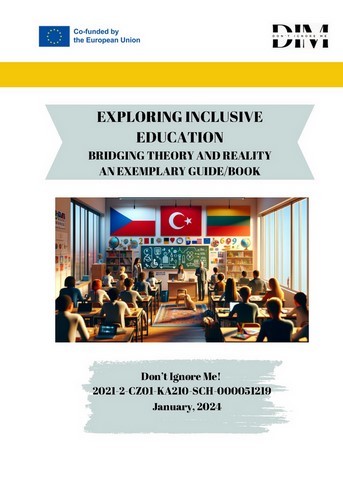DONT IGNORE ME

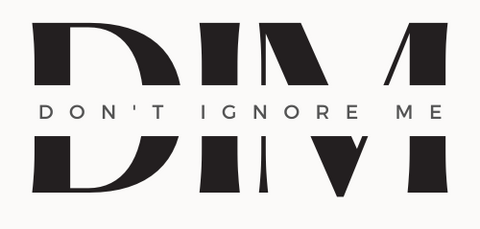
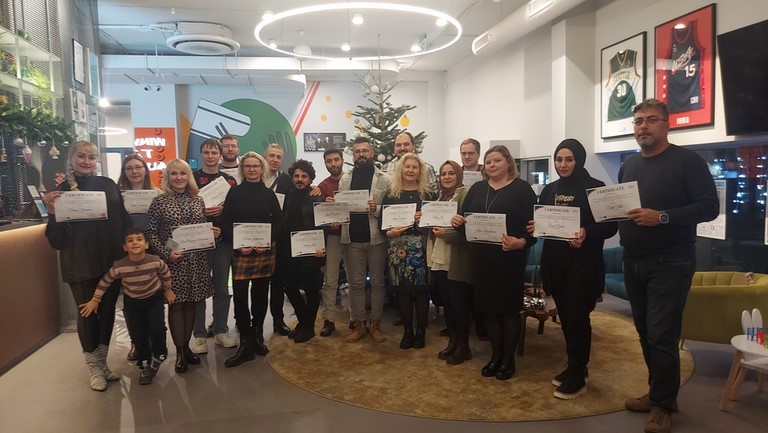
Objectives Of The Project
The project aims to:
The project aims to:
- Create environments where disabled and non-disabled individuals can interact positively.
- Educate the community about disabilities to foster a more inclusive society.
- Develop resources and tools that assist in the integration of disabled individuals into society.
Participating Organizations
COUNTRY | PARTNER ORGANIZATION |
|---|---|
CZECHIA | EDUCADEMY PRAGUE |
TURKEY | NEFUS NAKIPOGLU OZEL EGITIM UYGULAMA OKULU |
LITHUANIA | KAUNAS A. PUSHIN GYMNASIUM (KAUNAS INTERNATIONAL GYMNASIUM) |
| Expected Outcomes: This project is expected to:
| |
ACTIVITIES
The "Don't Ignore Me!" project is structured around several key activities:
See Me: A series of workshops and seminars in the Czech Republic that focus on understanding and supporting people with disabilities.
Pink Pencils: An art-based initiative in Turkey that pairs disabled students with non-disabled peers to promote mutual understanding and acceptance.
Play with Me: Activities in Lithuania designed to integrate children with socio-emotional and psychological disabilities into mainstream educational and social settings.
See Me: A series of workshops and seminars in the Czech Republic that focus on understanding and supporting people with disabilities.
Pink Pencils: An art-based initiative in Turkey that pairs disabled students with non-disabled peers to promote mutual understanding and acceptance.
Play with Me: Activities in Lithuania designed to integrate children with socio-emotional and psychological disabilities into mainstream educational and social settings.
Activity -1 See Mee - 21-25 November 2022 Prague, Czechia
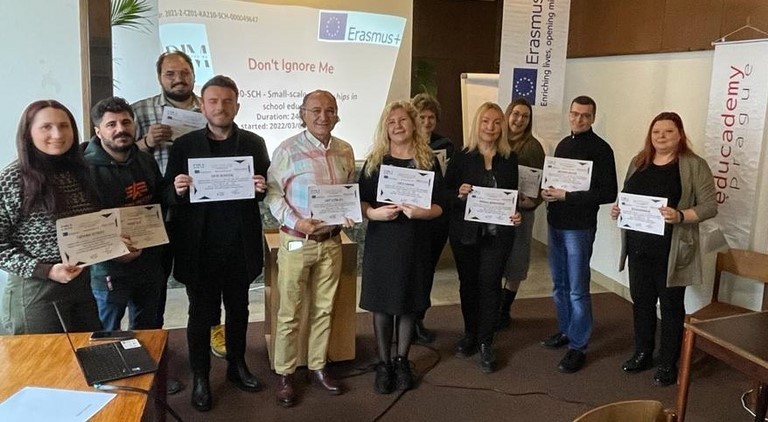
The "See Me" activity included several key components aimed at enhancing understanding and cooperation among the project partners and stakeholders. It took place in Prague and involved the following elements:
1. Kick-off Meeting: This initial meeting set the stage for the entire project. During this session, the duties and responsibilities of each partner throughout the project period were clarified and agreed upon.
2. Training Seminar: A seminar was held on society's perspectives on people with disabilities.
3. Cultural and Educational Exchange: The activity facilitated an exchange of ideas and methods in special education among participants, enhancing multicultural awareness and cooperation.
Contribution to Project Objectives:
• This activity directly contributed to the project’s broader goals by enhancing participants' knowledge about the integration of disabled people into society, raising awareness of EU policies and practices, and fostering international cooperation.
During the "See Me" activity in Prague, participants from each partner institution collaborated effectively to enhance the project's visibility and outreach. Together, they discussed the content of the project's web page and social media accounts, and undertook the task distribution for creating the book. Local events were strategically planned based on the overarching project, and discussions were held on methods to mitigate potential risks and enhance the quality of the project.
The meeting also provided an invaluable platform for participants to exchange best practices on inclusivity and accessibility in education. We deliberated on the details of the project's outputs and collaborated on designing dissemination strategies, online interactions, and the content for upcoming local events.
To ensure the project's objectives were being met, we prepared satisfaction surveys and developed tools to evaluate and enhance the activities of the project. The participants enhanced their understanding of EU citizenship, improved their foreign language and communication skills, and bolstered their professional competencies by sharing good practices with colleagues from diverse backgrounds.
Key decisions and actions taken during the event included:
• Each partner presented about their institution and their contributions to the main focus of the project.
• We finalized the project's logo and outlined the content strategy for our social media accounts.
• The content for the book, a crucial output of the project, was thoroughly reviewed. After finalizing the necessary templates, task assignments were distributed, and deadlines for task completion were set.
• Participants shared insights into best practices on societal perspectives towards disabilities.
• Planning for the next activity, "Pink Pencils," was carried out, setting the stage for continued collaboration and impact.
1. Kick-off Meeting: This initial meeting set the stage for the entire project. During this session, the duties and responsibilities of each partner throughout the project period were clarified and agreed upon.
2. Training Seminar: A seminar was held on society's perspectives on people with disabilities.
3. Cultural and Educational Exchange: The activity facilitated an exchange of ideas and methods in special education among participants, enhancing multicultural awareness and cooperation.
Contribution to Project Objectives:
• This activity directly contributed to the project’s broader goals by enhancing participants' knowledge about the integration of disabled people into society, raising awareness of EU policies and practices, and fostering international cooperation.
During the "See Me" activity in Prague, participants from each partner institution collaborated effectively to enhance the project's visibility and outreach. Together, they discussed the content of the project's web page and social media accounts, and undertook the task distribution for creating the book. Local events were strategically planned based on the overarching project, and discussions were held on methods to mitigate potential risks and enhance the quality of the project.
The meeting also provided an invaluable platform for participants to exchange best practices on inclusivity and accessibility in education. We deliberated on the details of the project's outputs and collaborated on designing dissemination strategies, online interactions, and the content for upcoming local events.
To ensure the project's objectives were being met, we prepared satisfaction surveys and developed tools to evaluate and enhance the activities of the project. The participants enhanced their understanding of EU citizenship, improved their foreign language and communication skills, and bolstered their professional competencies by sharing good practices with colleagues from diverse backgrounds.
Key decisions and actions taken during the event included:
• Each partner presented about their institution and their contributions to the main focus of the project.
• We finalized the project's logo and outlined the content strategy for our social media accounts.
• The content for the book, a crucial output of the project, was thoroughly reviewed. After finalizing the necessary templates, task assignments were distributed, and deadlines for task completion were set.
• Participants shared insights into best practices on societal perspectives towards disabilities.
• Planning for the next activity, "Pink Pencils," was carried out, setting the stage for continued collaboration and impact.
Activity -2 Pink pencils - 29 May - 02 June 2023 Istanbul, Turkey
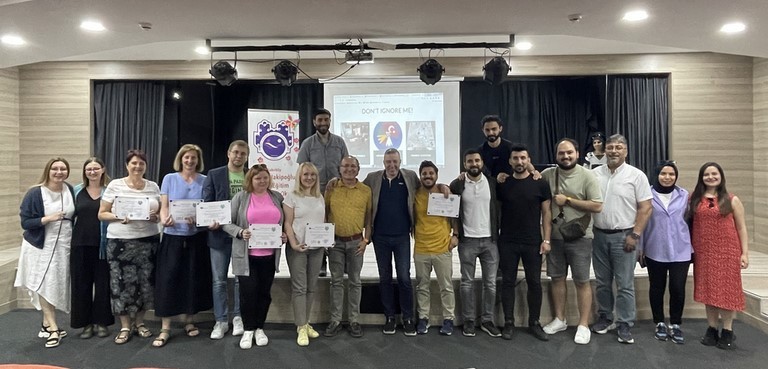
The "Pink Pencils" activity focused on to enhance awareness and promote inclusive interactions through art and drama, primarily involving students at various educational levels.
Key Elements of the Activity:
1. Drama and Interactive Sessions: The activity commenced with a drama session in the conference hall of our school, which involved students from primary, secondary, and high school levels. This session aimed to set the stage for empathy and understanding.
2. Initial Assessment: Students were asked to fill out forms expressing their initial thoughts on interacting with disabled peers, providing a baseline measure of their attitudes.
3. Inclusive Workshops: Following the initial drama activity, students with disabilities and students without disabilities were brought together in workshops. These sessions were designed to facilitate direct interaction and socialization, breaking down preconceived notions and barriers.
4. Post-Interaction Reflection: After the workshops, students without disabilities filled out another set of forms to document any changes in their perceptions and attitudes towards their disabled peers.
5. Evaluation and Awareness Training: The forms were evaluated to assess shifts in attitudes and identify areas where further awareness training was needed. Subsequent training sessions were then tailored to address these specific areas.
Target Group for this Activity:
• Primary Participants: Disabled students and students without disabilities from the hosting school.
• Secondary Beneficiaries: Educators, families of participating students (both), and affiliated institutions and organizations.
Expected Results:
• Enhanced Awareness: Increased awareness among students without disabilities and their families regarding disabilities.
• Reduced Social Pressure: Decreased social pressure experienced by students and families with disabilities, enhancing their motivation for societal participation.
• Empowerment: Disabled students were empowered to be seen as productive members of society, not just consumers.
• Educational Development: Educators gained exposure to new and effective teaching methods that promote inclusivity.
• Exemplary Practices: The activity served as a model of good practice for other institutions and organizations focused on special education.
The "Pink Pencils" activity effectively met its goals, confirming the project's commitment to fostering an inclusive educational environment and positively influencing perceptions toward disability. These efforts contribute significantly to the broader project objectives of improving social integration processes for the disabled and their families.
Key Elements of the Activity:
1. Drama and Interactive Sessions: The activity commenced with a drama session in the conference hall of our school, which involved students from primary, secondary, and high school levels. This session aimed to set the stage for empathy and understanding.
2. Initial Assessment: Students were asked to fill out forms expressing their initial thoughts on interacting with disabled peers, providing a baseline measure of their attitudes.
3. Inclusive Workshops: Following the initial drama activity, students with disabilities and students without disabilities were brought together in workshops. These sessions were designed to facilitate direct interaction and socialization, breaking down preconceived notions and barriers.
4. Post-Interaction Reflection: After the workshops, students without disabilities filled out another set of forms to document any changes in their perceptions and attitudes towards their disabled peers.
5. Evaluation and Awareness Training: The forms were evaluated to assess shifts in attitudes and identify areas where further awareness training was needed. Subsequent training sessions were then tailored to address these specific areas.
Target Group for this Activity:
• Primary Participants: Disabled students and students without disabilities from the hosting school.
• Secondary Beneficiaries: Educators, families of participating students (both), and affiliated institutions and organizations.
Expected Results:
• Enhanced Awareness: Increased awareness among students without disabilities and their families regarding disabilities.
• Reduced Social Pressure: Decreased social pressure experienced by students and families with disabilities, enhancing their motivation for societal participation.
• Empowerment: Disabled students were empowered to be seen as productive members of society, not just consumers.
• Educational Development: Educators gained exposure to new and effective teaching methods that promote inclusivity.
• Exemplary Practices: The activity served as a model of good practice for other institutions and organizations focused on special education.
The "Pink Pencils" activity effectively met its goals, confirming the project's commitment to fostering an inclusive educational environment and positively influencing perceptions toward disability. These efforts contribute significantly to the broader project objectives of improving social integration processes for the disabled and their families.
Activity -3 Play with Me - 26 November - 01 December 2023 Kaunas, Lithuania
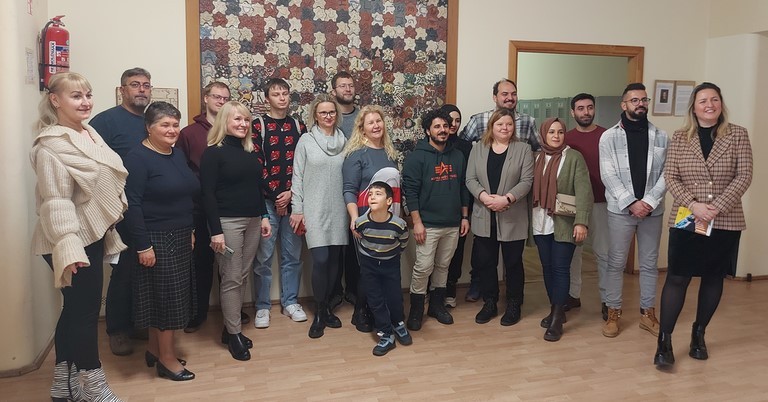
The "Play with Me" activity was designed to enhance social interaction and empathy between children with and without disabilities through structured play and inclusive games.
The key components of the activity included:
• Interactive Play Sessions: Facilitated games and activities that encouraged cooperation and understanding among participants.
• Educational Workshops: Sessions designed to educate non-disabled participants about the challenges faced by their disabled peers and how to support inclusion.
• Feedback and Discussion Rounds: Providing opportunities for participants to share their experiences and learn from each other’s perspectives.
The successful execution of the "Play with Me" activity according to the original plan contributed significantly to achieving the project’s objectives of fostering empathy and promoting inclusive interactions. Only one changed made according to decision of all partners after the first online meeting.
Outputs
Each partner organization created brochures detailing the methodologies, findings, and best practices from each mobility event, serving as educational tools for a broader audience.
Project website was launched, providing resources, event updates, and extensive information about the project's goals and activities.
A significant output was the creation of "A Good Example Handbook for Inclusive Education," compiled under the coordination of Czechia. This book encapsulates the project's learnings and serves as a guide for other institutions. The book published as a hard copy and also as an Ebook. Also we created a mobile app.
Project website was launched, providing resources, event updates, and extensive information about the project's goals and activities.
A significant output was the creation of "A Good Example Handbook for Inclusive Education," compiled under the coordination of Czechia. This book encapsulates the project's learnings and serves as a guide for other institutions. The book published as a hard copy and also as an Ebook. Also we created a mobile app.
Another booklet: Differences and Similarities in Special Needs Education in Czechia, Turkey, and Lithuania
The activities and resources provided by the project led to increased awareness and understanding of disabilities within the community, contributing to a shift in societal perceptions and behaviors towards more inclusivity.
Participants, including educators, parents, and students, gained new skills and knowledge, particularly in handling interactions with disabled individuals more empathetically and effectively
The activities and resources provided by the project led to increased awareness and understanding of disabilities within the community, contributing to a shift in societal perceptions and behaviors towards more inclusivity.
Participants, including educators, parents, and students, gained new skills and knowledge, particularly in handling interactions with disabled individuals more empathetically and effectively
